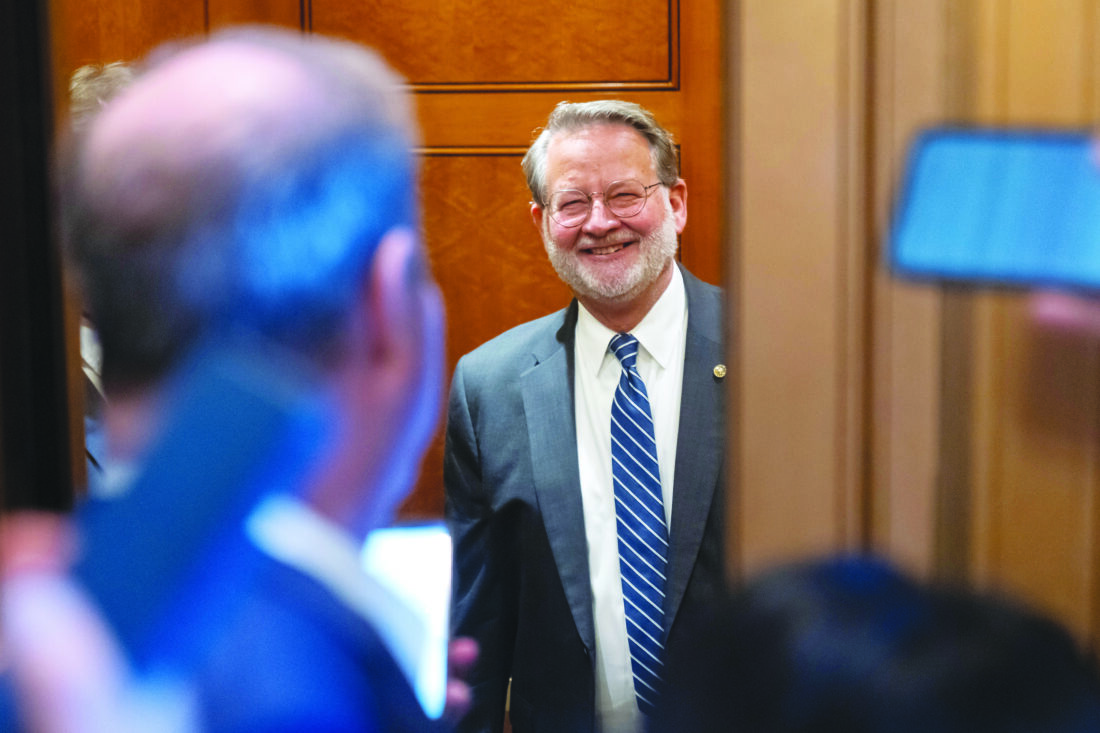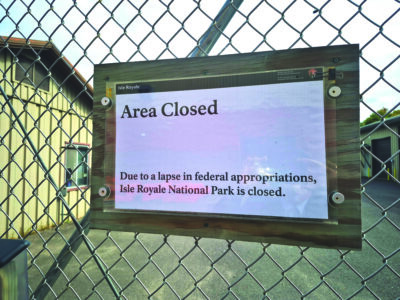Shutdown
No easy exit in sight

AP Photo/Mark Schiefelbein Sen. Gary Peters, D-Mich., speaks to reporters at the Capitol Wednesday.
WASHINGTON — The federal government started shutting down early Wednesday after Congress failed to approve a funding bill before the beginning of the new fiscal year — resulting in widespread ramifications for hundreds of programs and giving the Trump administration an avenue to fire federal workers en masse.
The U.S. Senate was unable to advance two short-term government funding bills Tuesday when Democrats and Republicans deadlocked for the second time this month, with just hours to go before the midnight Tuesday shutdown deadline.
Senators voted 55-45 on Republicans’ bill that would fund the government for seven weeks and 47-53 on a Democratic stopgap proposal that would keep the lights on for a month and included several health care provisions that they said were needed for their support. Neither had the 60 votes needed to advance.
Nevada Democratic Sen. Catherine Cortez Masto, Pennsylvania Democratic Sen. John Fetterman and Maine independent Sen. Angus King voted with GOP senators on their stopgap bill. Kentucky GOP Sen. Rand Paul voted against it.
White House Office of Management and Budget Director Russ Vought said in a memo to departments and agencies Tuesday night after the Senate vote that “affected agencies should now execute their plans for an orderly shutdown.” Vought said federal employees should report for their next regularly scheduled tour of duty to undertake shutdown activities.
The consequences of a shutdown will be sweeping in the nation’s capital and across the country, where states are bracing for the impact. About 750,000 federal workers could be furloughed, leading to a $400 million impact a day, the nonpartisan Congressional Budget Office reported. All federal employees would go unpaid until the shutdown is over.
Additionally, the Trump administration plans to lay off thousands of federal employees, which would reshape the federal workforce. President Donald Trump again vowed Tuesday to undertake layoffs and a major government employee union filed suit in federal court in advance of such a move.
More votes on GOP bill planned
Senate Majority Leader John Thune, R-S.D., said hours before the votes there wouldn’t be any talks with Democrats during a shutdown.
“The negotiation happens when the government is open. So let’s keep the government open and then we will have the negotiations,” Thune said.
“We’re happy to sit down and talk about these issues that they’re interested in,” he said. “But it should not have anything to do with whether or not for a seven-week period we keep the government open, so that this government can continue to do its work and that we can do our work through the regular appropriations process to fund the government.”
After the votes failed, Thune expressed his frustration with Democrats during a press conference.
“This is so unnecessary and uncalled for,” he said.
Thune said he plans to bring up a vote on the continuing resolution again. He said as soon as Wednesday the federal government can be funded if five Democrats voted with Republicans. “Democrats may have chosen to shut down the government, but we can reopen it tomorrow,” Thune said.
Republican Whip John Barrasso of Wyoming said the “cracks in the Democrats are already showing,” noting that three Democrats voted with Republicans Tuesday night.
“There is bipartisan support for keeping the government open,” Barrasso said. “We’re happy to see that the Democrats are already starting to break from (Senate Democratic Leader Chuck Schumer) and we’re going to continue to offer a clean (continuing resolution) on the floor of the Senate to open the government for the next seven weeks.”
Health care tax credits at center of standoff
The disagreement isn’t entirely about GOP lawmakers writing their short-term funding bill behind closed doors and then expecting Democrats to help advance it in the Senate, where bipartisanship is required for major legislation.
Democratic leaders have raised concerns for weeks about the end-of-year sunset of enhanced tax credits for people who buy their health insurance on the Affordable Care Act Marketplace, arguing a solution is needed now ahead of the open enrollment period starting on Nov. 1.
Democrats have also grown increasingly frustrated with the White House budget office’s unilateral actions on spending, arguing Vought is significantly eroding Congress’ constitutional power of the purse. Sen. Susan Collins of Maine, the Republican chairwoman of the U.S. Senate Appropriations Committee, said Tuesday the Government Accountability Office should sue the Trump administration over its efforts to freeze or unilaterally cancel spending approved by Congress.
Senate Minority Leader Chuck Schumer said Democrats need an agreement with Republicans to extend the enhanced tax credits. Schumer said people will begin getting notices in October telling them how much the cost of their ACA plans will increase during the next year, which he expects will ratchet up pressure on Republican leaders to broker a bipartisan agreement. “We’re going to be right there explaining to them it’s because the Republicans wouldn’t negotiate with us,” Schumer said, referring to consumers. “We’re ready to do it anytime. And there will be huge heat on (Republicans) on this issue.”
People who buy health insurance on the ACA marketplace and receive subsidies through enhanced ACA tax credits could expect to pay on average more than double for annual premiums in 2026 if the credits expire as scheduled at the end of this year, according to an analysis released Tuesday by the nonprofit health policy research organization KFF. The analysis found premiums could increase from an average of $888 this year to $1,904 in 2026.
Schumer also rebuffed GOP leaders saying that Democrats want to include people without legal immigration status in federal health care programs. “They say that undocumented people are going to get these credits. That is absolutely false. That is one of the big lies they tell, so they don’t have to discuss the issues,” Schumer said. “The federal government by law that we passed does not fund health insurance for undocumented immigrants in Medicaid, nor the ACA nor Medicare. Undocumented immigrants do not get federal health insurance premiums.”
Immigrants in the country without legal authorization are not eligible for Medicaid, and neither are most immigrants with legal status, such as those with student visas or enrollment in the Deferred Action for Childhood Arrivals program, known as DACA.
Only immigrants with a “qualified status,” such as legal permanent residents, asylees and refugees, are able to get Medicaid benefits, and they usually have to wait five years before their coverage can even begin.
Missouri Republican Sen. Josh Hawley said he is worried about the possible impacts of a shutdown on his home state and that keeping the government open is the only way to avoid that. “I’m sure the administration will do everything they can,” Hawley said. “But the solution is to not shut the government down. I mean, why would you punish working people because you’re not getting what you want on any issue, whatever it is.”
South Dakota Republican Sen. Mike Rounds said he doesn’t expect a shutdown will end until after Democrats have sent a message to their voters. “I’m not optimistic that we’re going to get a path forward until they’ve had a shutdown,” he said. Rounds, who negotiated a handshake agreement with the White House budget director this summer to preserve some funding for rural tribal radio stations after Congress eliminated funding for the Corporation for Public Broadcasting, said that deal could be affected by a shutdown.
“They’re putting the administration in a position where they can pick and choose what they’re going to do, and a shutdown is not going to be beneficial to these Native American radio stations,” Rounds said. Democratic Sen. Elissa Slotkin of Michigan said she wants Democrats and Republicans to negotiate on health care provisions.
Senate Minority Whip Dick Durbin of Illinois said that while Democrats agreed to help advance what’s known as a continuing resolution in March, they can’t now because of “what President Trump is doing to this country, particularly when it comes to health care costs for families.”
The shutdown will significantly affect the operations of the federal government as lawmakers have not passed any of the dozen full-year appropriations bills that finance agency operations. Oct. 1 is the beginning of the new fiscal year for the federal government.






